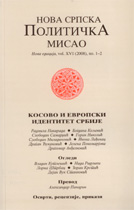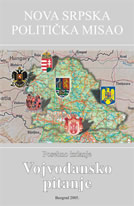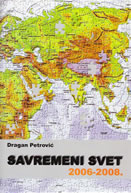| NSPM in English | |||
Serbia, the United States, and the Riddle of Europe |
 |
 |
 |
| петак, 26. фебруар 2010. | |
|
Remarks Delivered to the Johns Hopkins University Paul H. Nitze School of Advanced International Studies (SAIS)
I am truly honored to be the first ever Minister of Foreign Affairs of the Republic of Serbia to speak at SAIS—one of the most prestigious American graduate schools devoted to world affairs. Your presence on three continents—with the Washington campus now being supplemented by one in Bologna, and another in Nanjing—has greatly contributed to raising the overall quality of international debate in these tumultuous times. In my view, there is very little certainty and predictability left in the world. While the international system is undergoing a transformation in many ways similar to 1945 or 1989, I would argue that this time, the scope is far more comprehensive. For one, it is truly global—which is unprecedented. Furthermore, what we are witnessing is not just another generational reshuffling of the deck, but a drastic—and seemingly instantaneous—increase in the number of both cards and players. Across-the-board repositioning is taking place. It is getting increasingly difficult even to set the agenda, much less lead the way. I am of the opinion that the growing interdependence of the past few years has brought about a plethora of tangible benefits. However, the potential burden arising out of unintended consequences is truly staggering. We have yet to figure out a way how to deal with this new reality. Thankfully, there still are parts of the world where stability is apt to be a long-term condition. Those may serve as solid, reliable footholds in our uncertain times—as we try to get our bearings, while seeking ways to adapt to the changing circumstances. Strengthening these regions—making sure they remain sturdy bastions of peace and security—is a priority of the highest order. Serbia’s history and geography make us an integral part of one such area. And the belief we share with the American people in the noble, universal values of democracy forms the basis of our common vision of its future. Ladies and Gentlemen, I refer to a Europe that is wholly peaceful and integrated. This has not yet come about. Achieving both unity and peace across the entire Old Continent—thereby putting an end to centuries of wars, conflicts, revolutions, and strategic misunderstandings—is a greatly complicated matter. One may call it the Riddle of Europe. It would take me too far off course to discuss the matter at length. Suffice it to say that there exists a dichotomy between the current borders of the EU and the fact that a vast area of European territory remains beyond them. Geo-strategically speaking, Europe is still incomplete. What needs to be worked out is how to include the nations to its immediate east and south-east. In particular, Turkey and Russia, two countries that have without question been integral to European history. Turkey is uniquely important. With a firm bridgehead in continental Europe, it also stands at the center of Eurasia, acting as a key overland transportation and trade hub within that space. In addition, it has important cultural links with the Balkans, the Caucasus, the Caspian basin, and deep into Central Asia. Furthermore, its role as a major energy transit route to Europe cannot be over-stated. Turkey can easily become Europe’s strategic capacity multiplier for influence in the Middle East. By embracing Turkey—a Muslim democratic nation—the EU would transform itself from being perceived as a partisan actor, to an honest broker in a crucial geopolitical theatre of the 21st century. Yet its EU accession process is at a virtual stand-still—principally due to claims that Turkey is civilizationally and confessionally foreign. This could have profound consequences for the EU. With regards to Russia, the obvious needs to be stated. Unquestionably, it has been a crucial player in all European historical acts. Russia remains a nuclear and natural resource superpower. Moreover, its voice in global affairs continues to carry a great deal—not only because of its veto-weilding power in the Security Council. Without trying to discount significant and understandable reservations, I think it is impossible to contest that it is of critical importance to find a way of being inclusive of Russia. This is both a security and economic imperative. In short, the questions of Turkey and Russia go to the heart of the Riddle of Europe. I have no ambition to provide you with answers to them. But I am certain that the EU must first ensure stability within its inner geographic space. And this cannot be achieved without the countries of the Western Balkans becoming full members of the European Union. Rapidly joining the EU is Serbia’s central strategic priority. Our domestic debate about where we want to go is over. We held two national elections in 2008—one presidential, the other parliamentary. For us, these were referenda on how to interact with the world of today. Our citizens were given a clear choice between two diametrically opposite ways forward. And they decided to cast their vote for a European future. Twice. Serbia has worked very hard to get to this point. In the face of numerous obstacles and against overwhelming odds, we have consolidated our democracy. We have done so not out of fear of being left behind, but out of a self-confidence that this is where we belong, and in our ability to make a non-trivial contribution to solving the Riddle of Europe. From where we stand, the finish line can be seen. But we’re not there quite yet. Unresolved issues must still be addressed, swiftly and without delay, in a candid and forthright manner. Ladies and Gentlemen, With all due respect to a number of other delicate matters, I believe only two major obstacles stand in the way of irreversibly consolidating the Western Balkans. One is a divergence of views on how to secure the prosperity of Bosnia; the other is a disagreement on Kosovo’s future status. A worn out method of dealing with these problems consists in having external stakeholders try to impose pre-determined outcomes—an approach that can’t help but remind us of Thucydides’ Melian Dialogue, where justice is interpreted by the Athenian generals as ‘might makes right.’ Rigidly pursuing an agenda that calls for a centralized Bosnia and cementing the secession of Kosovo—regardless of costs—is at once superficial and unsustainable. It dismisses the legitimate concerns of countries like Serbia as irrelevant variables in the regional equation. Perhaps most importantly, it simply does not pass the test of democratic legitimacy. Thanks to the statesmanship and vision of President Boris Tadic, today’s Serbia is a full-fledged, peaceful democracy—a lynchpin contributor to the stability of the Western Balkans. Our foreign policy is the product of a de facto public consensus, driven by a firm electoral majority. This fact must not be ignored. Ladies and Gentlemen, We believe that the only way forward lies in dialogue and engagement. We remain mindful of geopolitical realities and respectful of everyone’s legitimate constraints. But at the end of the day, there is no alternative to working together in addressing outstanding regional challenges, as responsible stakeholders in a common enterprise. Integral to these efforts is the United States, a key actor on the world stage and in the Western Balkans. America could play a critical role in shaping outcomes that are acceptable to all involved—and that can hardly take place without fully engaging Belgrade. This is the right strategic choice, but it will not be simple. Our disagreement on Kosovo has complicated matters significantly, to be sure. Nonetheless, thanks to concerted efforts, last year we were able to press the reset button on our bilateral relationship, in essence agreeing to contain our differences. In 2009, we started the process of recalibration. In 2010, we could start forging a productive partnership. Should we succeed, we would invariably end up reinforcing each other’s strategic influence in the region. As a result, Serbia and the United States, each in our own way, would come to be appreciated as complementary providers of stability in the Western Balkans. Ladies and Gentlemen, My Government has no interest in freezing the unresolved regional issues. I cannot stress this enough, for we need to arrive at consensual solutions at all deliberate speed. Let us begin with Bosnia and Herzegovina. As our most important neighbor, we see Bosnia’s prosperity as crucial to that of the Western Balkans. Time and again, we have emphasized our absolute commitment to its sovereignty and territorial integrity. Serbia’s ‘One-Bosnia Policy’ is the surest guarantee that the country will not break up. We have also taken a number of concrete steps towards full reconciliation—a legal and political, but also a moral imperative for all the nations of the region to embrace. President Tadic traveled to Srebrenica on the 10th anniversary of the massacre to bow to the victims of that terrible war crime, and has apologized for the wrongdoings of the previous regime on a number of occasions. Serbia is fully cooperating with the International Criminal Tribunal for the former Yugoslavia in the Hague, and is doing everything it can to locate, arrest and extradite the two remaining at-large indictees. Lastly, our National Assembly will soon begin debate on a historical resolution on Srebrenica that will unequivocally condemn the crime that took place there. Serbia will also continue to encourage representatives of all the three constituent peoples to agree on necessary reforms, with the aim of accelerating Bosnia’s EU accession—a strategic priority for all. At the same time, we have made it clear that we are not a direct negotiator in the Bosnian process. But like other responsible stakeholders, we will continue to exercise our influence in a constructive way, by making it clear that we will support whatever arrangement is acceptable to the three sides—stressing the need for mutual respect, pragmatism and compromise. A centralized Bosnia is not a viable outcome—and neither is partition. International efforts should be focused on finding a middle ground solution everyone can sign on to. Our way of looking at the situation in Bosnia has been informed by the fact that consensus-building is a core 21st-century European value and decision-making principle, aptly illustrated by the fact that on important institutional changes, all must give their consent. Sometimes this takes longer than one would like, as the Lisbon Treaty ratification process reminds us. But it’s the best way to ensure moving forward to the next stage in the historic process of forging a perpetual peace in an ever closer Union. The consensus principle has also guided our approach to resolving the other major challenge to regional stability: UDI—the February 17th, 2008, unilateral declaration of independence by the ethnic-Albanian authorities of Serbia’s southern province of Kosovo and Metohija. Ladies and Gentlemen, Despite all claims to the contrary, Kosovo’s status remains an open issue. UDI was an attempt to impose a one-sided outcome where one party gets everything, and the other nothing. It failed to win the support of the Security Council, the European Union, and a vast majority of UN member States. As such, it is not sustainable. I believe it is our shared responsibility to take whatever steps are required to extricate ourselves, in a creative way, from this quagmire. This is precisely the approach Serbia has actively embraced. We responded to Kosovo’s UDI with utmost restraint, in a way designed to overcome differences, not entrench them. At Serbia’s initiative, an issue of such fundamental importance and complexity—passionately involving all at once identity, boundaries, communal rights, opposing historical narratives—was steered clear of resorting to the force of arms, for the first time in the history of our region. From the very outset of this grave crisis, we sought to compartmentalize the political fallout. We did not seek confrontation, but compromise. To that end, Serbia made sure the province’s local population—irrespective of ethnicity—did not fall victim to status disagreements. We worked closely with the UN and the EU on resolving practical matters on the ground in a status-neutral manner, to the benefit of all of Kosovo’s residents. In addition, we turned to the instruments of peaceful adjudication. Our decision to contest Kosovo’s UDI at the International Court of Justice—by prevailing in the United Nations General Assembly—constitutes a paradigm shift in favor of peace in the Western Balkans. By pursuing such an approach to UDI, Serbia in effect put forward a new model for ethnic conflict resolution in the 21st century—one that could be applied anywhere in the world where the divides are deep, the historical burdens heavy, and the issues involved go to the very heart of defining one’s national identity. By doing so, we have highlighted the importance of strictly respecting a rules-based approach to global governance. In the increasingly interdependent world, Serbia believes that even deep-seated disagreements can and should be resolved in an atmosphere of mutual respect, through consensus—not by imposition or unilateral action. Ladies and Gentlemen, The Kosovo case marks the first time that the International Court of Justice will rule on the legality of an attempt at secession by an ethnic group from a UN member State in peacetime. Objections have been raised to the entire exercise by those who claim that UDI is irreversible. In my view, that’s like someone saying a court should not involve itself in a suspected arson case, because the house has already burned down. The Court has begun its deliberations on the legality of UDI. It is expected to deliver its ruling in the next few months. A record number of countries presented their views during the recently-held oral arguments, including all five permanent members of the Security Council for the first time in history. Once the Court hands down its opinion, an opportunity will be created for a dialogue that can produce a mutually-acceptable, viable solution to the future status of Kosovo—one that will not recklessly sacrifice geo-strategic priorities of all, on the altar of communal aspirations of a single party. Serbia has respectfully played by the rules of international relations, in order to create a set of circumstances where the incentives for coming together in agreement will outweigh all other considerations. Let me make it absolutely clear that we stand ready to flexibly engage in good-faith, for our intent is not to triumph or to subjugate, but to truly resolve the issue in a way that will contribute to advancing regional priorities, within the framework set forth by international law. Ladies and Gentlemen, Serbia is not after maximalist gains. We are not looking to set aright historical wrongs, either. But we are determined to complete the democratic consolidation of the Western Balkans. We believe this is where leaders can make a tangible difference. They can set the right proportion of means to ends, as well as the right balance of what is needed to what may be desired, so that real and lasting stability may take root for good. In my view, that is the role of statecraft: to bridge the divides, whilst securing legitimacy. This could be taken as one of Abraham Lincoln’s fundamental lessons. On the occasion of taking the Oath of Office as President of the United States, in the speech in which he referred to secession as the “essence of anarchy,” he looked to the future, and called for solutions to be reached by appealing to what he termed the “better angels of our nature.” We should look back to his words for inspiration, for I believe the moment has arrived for trying to come together in the democratic spirit, and creating a better, more inclusive era for all in a free and united Europe. I believe 2010 can be our year of peacemaking, if we choose to do the right thing, combine courage with prudence, and appeal to the better angels of our nature. Thank you. |
Од истог аутора
- Из архиве - Remarks Before the Foreign Affairs Committee of the European Parliament
- From Balkan Wars to Balkan Peace
- Serbia is dedicated to solving all differences at the negotiating table
- Our Kosovo policy will not change
- 2009 was Serbia’s best EU accession year ever
- We will never recognize UDI
- Kosovo is without a doubt the darkest corner of Europe
- Serbia will be a bridge between the European Union and the African Union
- Kosovo is our Jerusalem
- Minister of Foreign Affairs Vuk Jeremic’s Speech at the UN SC
- Address Before the Second Serbian Ambassadors’ Conference
- One Nation, Indivisible
Остали чланци у рубрици
- Playing With Fire in Ukraine
- Kosovo as a res extra commercium and the alchemy of colonization
- The Balkans XX years after NATO aggression: the case of the Republic of Srpska – past, present and future
- Из архиве - Remarks Before the Foreign Affairs Committee of the European Parliament
- Dysfunction in the Balkans - Can the Post-Yugoslav Settlement Survive?
- Serbia’s latest would-be savior is a modernizer, a strongman - or both
- Why the Ukraine Crisis Is the West’s Fault
- The Ghosts of World War I Circle over Ukraine
- Nato's action plan in Ukraine is right out of Dr Strangelove
- Why Yanukovych Said No to Europe

.jpg)








 Ladies and Gentlemen,
Ladies and Gentlemen,












